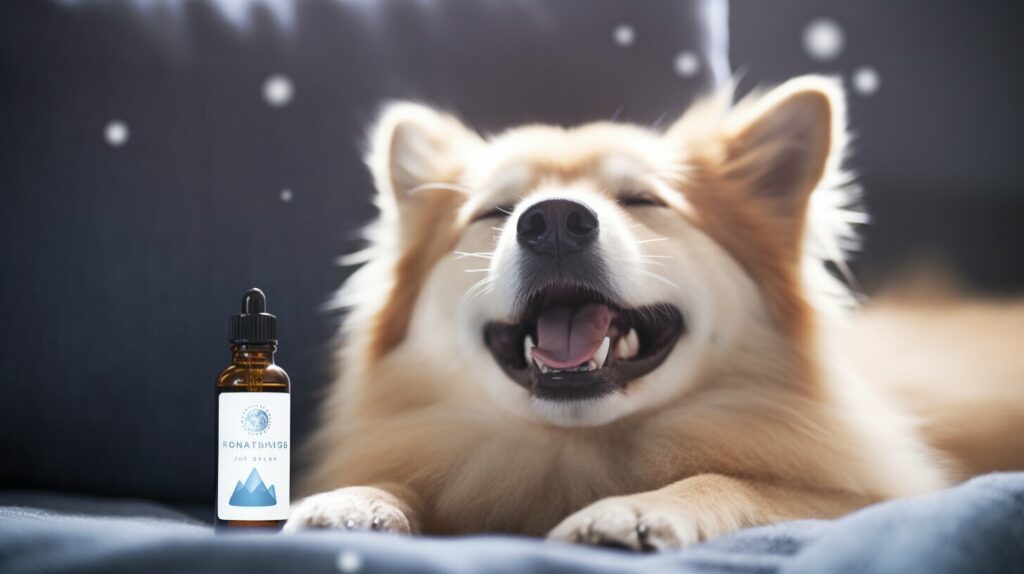If you have a dog, you want to keep them healthy and happy. One way to do this is by considering melatonin as a supplement. This hormone, which is naturally produced by dogs and humans, can be used to help regulate sleep and reduce anxiety in dogs.
It’s important to understand the benefits and dosage guidelines for melatonin in dogs to ensure their safety and well-being. Read on to learn more.
Key Takeaways:
- Melatonin is a natural hormone that can help regulate sleep and reduce anxiety in dogs.
- Proper dosage guidelines for melatonin in dogs are essential for their safety.
- Consult with your veterinarian before administering melatonin to your dog to ensure the correct dosage and efficacy.
The Benefits of Melatonin for Dogs
Melatonin is a hormone naturally produced by the pineal gland in the brain that helps regulate sleep and wake cycles. It is also available as a supplement, which has shown to be beneficial for dogs in various ways.
If your dog has trouble sleeping or suffers from anxiety, melatonin may be a natural solution to help them relax and get the rest they need. Unlike other sleep aids or anxiety medications, melatonin is not habit-forming and has little to no side effects when used properly.
Some of the key benefits of melatonin for dogs include:
- Reducing anxiety: Melatonin can help soothe nervous dogs and reduce symptoms of anxiety, such as pacing, restlessness, and trembling.
- Promoting better sleep: Melatonin can help regulate a dog’s sleep cycle, making it easier for them to fall asleep and stay asleep throughout the night.
- Alleviating certain health issues: Melatonin has shown to be effective in treating certain health issues in dogs, such as Cushing’s disease and separation anxiety.
When considering using melatonin for your dog, it’s important to choose a product specifically designed for dogs and to follow dosage guidelines based on your dog’s weight and size. Additionally, you may want to consult with your veterinarian to ensure that melatonin is a safe and appropriate solution for your dog’s specific needs.
In addition to melatonin supplements, there are also natural sources of melatonin that you can include in your dog’s diet. Foods such as cherries, oats, and rice bran contain melatonin and may help promote better sleep and reduce anxiety in dogs.
Overall, melatonin can be a safe and effective solution for dogs struggling with sleep or anxiety issues. When used properly, it can help improve their quality of life and promote a healthier, happier dog.
Understanding Melatonin Dosage for Dogs
If you’re considering giving your dog melatonin, it’s essential to give the right dose for their safety and well-being. From body weight to the type of melatonin available, there are several factors to consider. Here’s what you need to know about melatonin dosage for dogs.
Consult Your Veterinarian
Before giving your dog melatonin, we recommend consulting with a veterinarian. They can guide you on the appropriate dosage and provide advice on how to administer it. Your veterinarian will also check for any underlying health issues that could be affecting your dog’s sleep or anxiety levels. Based on their analysis, they can advise you on the right melatonin dosage for your dog.
Factors Affecting Melatonin Dosage for Dogs
The correct melatonin dosage for dogs depends on several factors, including their size, weight, age, and overall health. A general rule is to give 1mg of melatonin for every 20 pounds of body weight. However, it’s important to check the specific dosage guidelines for the product you’re using. Some types of melatonin may have different concentration levels, affecting the correct dosage amount.
You must also consider the reason for giving your dog melatonin. The dosage of melatonin for dogs with anxiety may be different than the dosage for those with sleep issues. Again, your veterinarian can guide you on the appropriate dosages for your dog’s specific needs.
Choosing the Right Form of Melatonin
Melatonin is available in various forms, including tablets, liquids, and treats. It’s essential to use the right form to give the correct dosage. For example, if you’re using melatonin tablets, you may need to break them down into smaller pieces to get the right dose for your dog’s size. Melatonin dog treats are an easy option, but their concentration levels can vary, meaning some may need more than others.
Monitoring for Side Effects
While melatonin is generally considered safe for dogs, side effects can occur. These can include drowsiness, digestive issues, and changes in appetite. If you notice any side effects, you should stop giving your dog melatonin and consult your veterinarian.
Overall, melatonin is an effective supplement for managing sleep or anxiety issues in dogs. By following the correct dosage guidelines and working with your veterinarian, you can safely use melatonin to improve your dog’s well-being.
Safe Administration of Melatonin for Dogs
Administering melatonin to your dog can offer many benefits, but it’s important to do so safely and correctly. Improper dosage or administration can cause potential side effects and harm your furry friend. Here are some guidelines to follow when giving your dog melatonin:
Choose the Right Form of Melatonin
Melatonin can come in various forms such as tablets, chews, or liquid drops. Be sure to choose the form that is most convenient and suitable for your dog’s needs. Consult with your veterinarian to determine the best option.
Follow the Recommended Dosage
The appropriate dosage of melatonin can vary based on your dog’s size, weight, and specific needs. Consult with your veterinarian to determine the proper dosage for your dog. Always follow the recommended dosage instructions and avoid administering more than necessary.
Administer Melatonin at the Right Time
Melatonin should be given to your dog at the recommended time as directed by your veterinarian. It is generally recommended to administer it in the evening before bedtime to promote better sleep. However, your veterinarian may recommend a different time depending on your dog’s specific needs.
Monitor Your Dog’s Reaction
It’s important to monitor your dog’s reaction to melatonin. Watch for any potential side effects such as nausea, vomiting, or excessive drowsiness. If your dog experiences any adverse effects, contact your veterinarian immediately.
Store Melatonin Safely
Keep melatonin out of reach of children and pets, and store it in a cool, dry place away from direct sunlight, heat, or moisture. It’s also important to check the expiration date before administering any medication to your dog.
Consult with Your Veterinarian
Before giving your dog melatonin, always consult with your veterinarian to ensure it is safe and appropriate for your pet’s needs. Your veterinarian can also provide guidance on dosage, administration, and any potential interactions with other medications your dog may be taking.
By following these guidelines, you can safely and effectively administer melatonin to your furry friend, helping to improve their quality of life and overall well-being.
Using Melatonin for Dog Anxiety
If you have a dog that suffers from anxiety, you know how overwhelming it can be for both you and your pet. When dogs get nervous or scared, it can cause them to exhibit destructive behavior or become easily agitated. This is where melatonin can potentially help.
Melatonin for dog anxiety is gaining popularity among pet owners, as it’s a natural way to help calm your dog down. Melatonin is a hormone that’s produced naturally in the body and is responsible for regulating sleep and wakefulness cycles. When given to dogs in the appropriate dosage, it can help promote relaxation and reduce anxiety.
Melatonin for dogs is available in various forms, including tablets, capsules, and even treats. The dosage will depend on your dog’s size, weight, and specific needs, so it’s important to consult with your veterinarian before administering it. Generally, the recommended dosage for anxiety-related issues is 1-6 mg of melatonin per 30-40 pounds of body weight, given 30-60 minutes before bedtime.
It’s important to note that while melatonin is generally safe for dogs, there are some potential side effects to be aware of, including dizziness, vomiting, and diarrhea. Additionally, melatonin can interact with certain medications, so always check with your veterinarian before giving it to your dog.
If you’re considering using melatonin for your dog’s anxiety, it’s important to integrate it into their routine gradually. Start with a lower dosage and monitor your dog’s behavior to see how they respond. With proper dosage and administration, melatonin can potentially help your dog feel more relaxed and calm.
Melatonin for Improved Sleep in Dogs
If your furry friend is struggling to get a good night’s sleep, melatonin may be a safe and effective solution. Here’s what you need to know about using melatonin for dog sleep:
What Affects Your Dog’s Sleep?
Various factors can impact your dog’s sleep patterns. For example, if you have an active puppy who spends a lot of time playing during the day, they may have trouble settling down at night. Similarly, older dogs may experience difficulty sleeping due to health conditions like arthritis or cognitive dysfunction. And just like people, dogs can also suffer from anxiety, which can make it difficult for them to fall asleep and stay asleep.
How Melatonin Can Help
Melatonin is a hormone that regulates sleep and wake cycles, and it’s found naturally in your dog’s body. By supplementing your dog’s natural melatonin levels, you can help regulate their sleep cycle and promote better sleep. Additionally, melatonin has calming properties that can help alleviate anxiety and promote relaxation.
Recommended Dosage
The recommended dosage of melatonin for dog sleep varies depending on your dog’s size and weight. In general, the recommended dosage is 1-3 mg of melatonin for every 30 pounds of body weight. It’s important to speak with your veterinarian before administering melatonin to your dog to ensure that you’re giving them the correct dosage.
Integrating Melatonin into Your Dog’s Routine
There are several ways to give your dog melatonin, including melatonin dog treats, capsules, or liquid drops. It’s essential to follow the manufacturer’s instructions for administration, and to be consistent with your dog’s dosage and timing. For best results, it’s recommended to give your dog melatonin about 30 minutes before bedtime to help them relax and fall asleep.
If you notice any adverse effects after giving your dog melatonin, stop administering it immediately, and contact your veterinarian. Some dogs may experience side effects such as vomiting, diarrhea, or excessive drowsiness.
Melatonin can be an effective and safe tool for promoting better sleep in dogs. However, always consult with your veterinarian before giving melatonin to your pet, and be sure to follow dosage guidelines carefully to keep your furry friend safe and healthy.
Natural Alternatives to Melatonin for Dogs
While melatonin can be a helpful supplement for dogs, it’s not the only option available. Some pet owners may prefer natural alternatives, which can offer similar benefits without the potential side effects of medication.
One natural alternative to melatonin for dogs is chamomile. Chamomile is a calming herb that can help dogs with anxiety issues. It can be found in tea form or as a supplement and can be given to dogs as needed to help them relax. Another herb that may be beneficial is valerian root. This herb has mild sedative properties and can help dogs with anxiety or sleep issues.
Essential oils may also be used to help calm anxious dogs. Lavender, for example, is a natural relaxant and can be added to a diffuser or applied topically to help soothe dogs. It’s important to note that essential oils should never be applied directly to a dog’s skin without being diluted first.
Additionally, there are certain lifestyle changes that can help reduce anxiety and improve sleep in dogs. Daily exercise, a consistent routine, and a comfortable sleeping environment can all contribute to a dog’s overall well-being.
If you’re considering natural alternatives to melatonin for your dog, it’s important to consult with a veterinarian beforehand. They can provide guidance on the appropriate dosage and ensure that any natural supplements or remedies won’t interact with your dog’s current medications or health conditions.
Understanding Potential Side Effects of Melatonin in Dogs
While melatonin can have several benefits for dogs, it is crucial to be aware of potential side effects as well. Here are some of the most common side effects:
- Vomiting
- Diarrhea
- Increased heart rate
- Allergic reactions
If your dog experiences any of these side effects after taking melatonin, it is essential to stop administering the supplement and contact your veterinarian immediately. It is also important to keep in mind that melatonin may interact with other medications, so be sure to inform your vet if your dog is taking any prescription drugs.
While melatonin is generally safe for dogs, it should not be given to pregnant or lactating dogs without consulting a vet first. Additionally, it should not be given to dogs with certain health conditions, such as liver disease or diabetes, without veterinary guidance.
Overall, it is important to monitor your dog’s reaction to melatonin and consult with a veterinarian before administering the supplement. With proper use, melatonin can be a safe and effective way to help your furry friend manage anxiety and improve sleep.
Melatonin Dogs: Frequently Asked Questions (FAQs)
If you’re considering using melatonin for your dog, you likely have some questions. Here are some frequently asked questions about melatonin for dogs:
What is melatonin, and how does it work?
Melatonin is a naturally occurring hormone produced in the pineal gland of animals, including dogs and humans. It regulates sleep and wake cycles, among other functions. Using melatonin supplements can help promote better sleep for dogs by regulating their sleep cycle.
What are the benefits of using melatonin for dogs?
Melatonin can be beneficial for dogs in several ways, such as reducing anxiety, promoting better sleep, and potentially alleviating certain health issues such as Cushing’s disease. It can also help dogs who have trouble adjusting to a new schedule or environment, such as during travel or moving.
What is the recommended dosage of melatonin for dogs?
The appropriate dosage of melatonin for dogs depends on their size, weight, and specific needs. As a general guideline, dogs weighing under 25 pounds can take 1.5 mg, while dogs over 25 pounds can take 3 mg. It’s important to follow the specific dosage instructions provided by your veterinarian or the melatonin product’s label.
Can melatonin interact with other medications?
As with any supplement or medication, it’s important to consult with your veterinarian before administering melatonin to your dog if they are currently taking other medications. Melatonin may interact with certain medications, such as blood thinners or sedatives. Your veterinarian can help determine if melatonin is safe to use in conjunction with any other medications your dog is taking.
What are the potential side effects of using melatonin for dogs?
While melatonin is generally considered safe for dogs, there are potential side effects to be aware of. These may include drowsiness, diarrhea, and changes in appetite. In rare cases, melatonin may cause an allergic reaction. It’s important to monitor your dog for any adverse effects and consult with your veterinarian if you have any concerns.
Can I give my dog melatonin dog treats instead of supplements?
Yes, there are melatonin dog treats available on the market. These may be a convenient way to administer melatonin to your dog and may be more appealing to some dogs. However, it’s still important to follow proper dosage guidelines and consult with your veterinarian before using any melatonin product.
Is there a specific time of day I should give my dog melatonin?
The timing of melatonin administration can vary depending on your dog’s specific needs and the reason for using melatonin. If you’re using melatonin to promote better sleep, it’s typically recommended to give it to your dog around 30 minutes before bedtime. However, it’s important to follow any specific instructions provided by your veterinarian or melatonin product label.
Conclusion
Now that you have a better understanding of melatonin for dogs, you can make informed decisions about using it to improve your pet’s health and well-being. Remember to always follow dosage guidelines and consult with a veterinarian before administering melatonin to your dog.
Using melatonin can help alleviate anxiety and promote better sleep in dogs, but it’s important to be aware of potential side effects and use it safely. If you’re considering using melatonin for your dog, be sure to explore natural alternatives and consider their effectiveness as well.
Overall, melatonin can be a useful supplement for dogs, but it’s important to use it responsibly. By following the guidelines and recommendations outlined in this article, you can help ensure that your furry friend stays happy and healthy.
FAQ
Q: What are the benefits of melatonin for dogs?
A: Melatonin can help with dog anxiety, promote better sleep, and potentially alleviate certain health issues.
Q: How do I determine the appropriate melatonin dosage for my dog?
A: The proper dosage can vary depending on your dog’s size, weight, and specific needs. It’s important to consult with a veterinarian to ensure the correct dosage.
Q: Are there any side effects of melatonin in dogs?
A: While melatonin is generally safe for dogs, there can be potential side effects. It’s important to be aware of these and monitor your dog’s reaction. Consult a veterinarian if any adverse effects occur.
Q: Can melatonin interact with other medications my dog is taking?
A: It’s possible for melatonin to interact with certain medications. It’s crucial to inform your veterinarian about any medications your dog is currently taking to avoid potential interactions.



